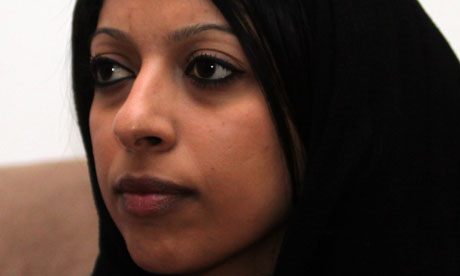Britain and the European Union have heaped diplomatic pressure on Bahrain over the alleged killing of pro-democracy activists in custody, while the health of a hunger striker protesting at the beating and arrest of her dissident father has deteriorated markedly.
In a meeting with Interior Minister Shaikh Rashid bin Abdulla Al Khalifa, the British ambassador to Bahrain, Jamie Bowden, raised concerns over the deaths of four dissident prisoners in the last week. Catherine Ashton, the EU's high representative for foreign affairs, speaking through a spokesman also called on the Bahrain regime to immediately release all those who have been detained for peacefully expressing themselves. Ashton announced she is to visit Bahrain next week and her spokesman called on the authorities to "investigate all recent events which have resulted in loss of life and injuries".
The high-level interventions follow what pro-democracy activists in Bahrain complain has been a period of minimal censure from Europe and the US of the renewed crackdown. They came as Zainab al-Khawaja, a 27-year-old mother on hunger strike following the beating and arrest of her father, Abdulhadi al-Khawaja – a prominent human rights activist – along with her husband and brother-in-law, saw her health slump. She had been speaking out against the government's treatment of her family through the media and her Twitter blog but she struggled to stand up, vomited and could no longer breastfeed her 18-month-old daughter, according to her mother.
"I asked if I could put some sugar in her water because I can see her suffering and her daughter is crying for milk because she can't breastfeed her. She said no," said Khadija al-Khawaja, 52. "She is just sleeping. I go and wake her up, she opens her eyes and speaks to me and says she is OK. I told her you have a little girl whose father is not here and if anything happens to you … but she feels she needs to do something. She is very angry and very upset about what is happening."
The family has received no information about the fate of Abdulhadi, Zainab's husband Wafu Almajed or her brother-in-law Hussein Ahmed. But there was hope for her uncle who was arrested three weeks earlier, when his wife was called to bring clothes for him to the military court building, though she was not allowed to see him. Abdulhadi was beaten and arrested after he denounced the King of Bahrain and called for him to be put on trial. It is thought the two other men were arrested because they were with him at the time, but were not the targets.
The Bahraini government has widened its crackdown on dissent by preparing a case to dissolve Al Wefaq, a registered political society that previously held 18 of the 40 seats in the chamber of deputies before it withdrew in protest at the government's handling of demonstrations in February. It is also trying to shut down the Islamic Action Society, another registered society. A spokesman for the British foreign office denounced the move as "a backward step for reform" and said "the best way out of the situation is through inclusive dialogue".
Kareem Fakhwiri, a member of Al Wefaq, was buried on Wednesday after he died in police custody and suffered extensive bruising.
"We are deeply concerned by the many reports of human rights abuses in Bahrain," said a foreign office spokesman. "We are particularly worried by the deaths of four prisoners in the past week. Our ambassador raised these deaths with the minister of interior on 14 April. We call on the government to investigate them fully and transparently and we continue to urge the Bahraini authorities to act in accordance with the law and to meet international standards for the treatment of detainees."
Khadija al-Khawaja said she was increasingly afraid the authorities would call to announce her husband's death, after she visited Kobra Fakhwiri, the widow of Kareem Fakhwiri.

No comments:
Post a Comment